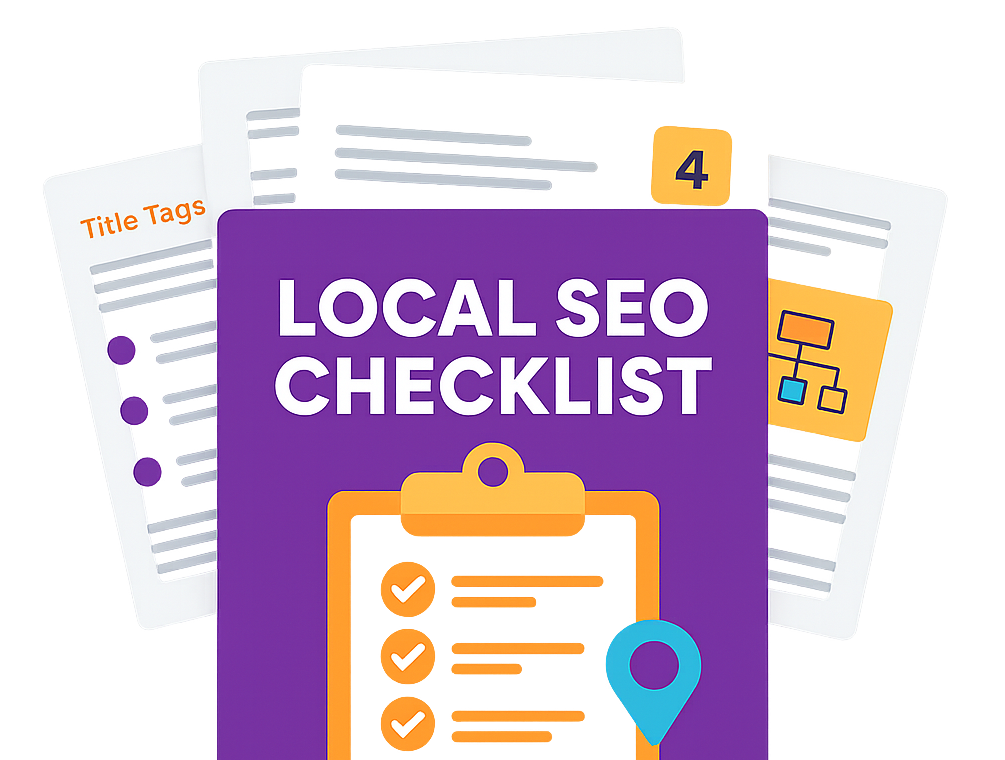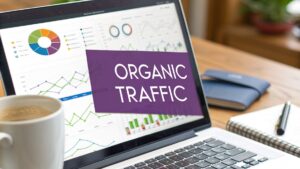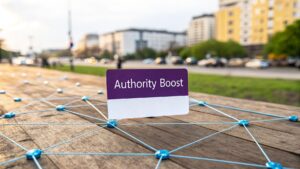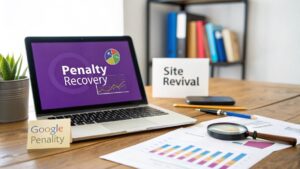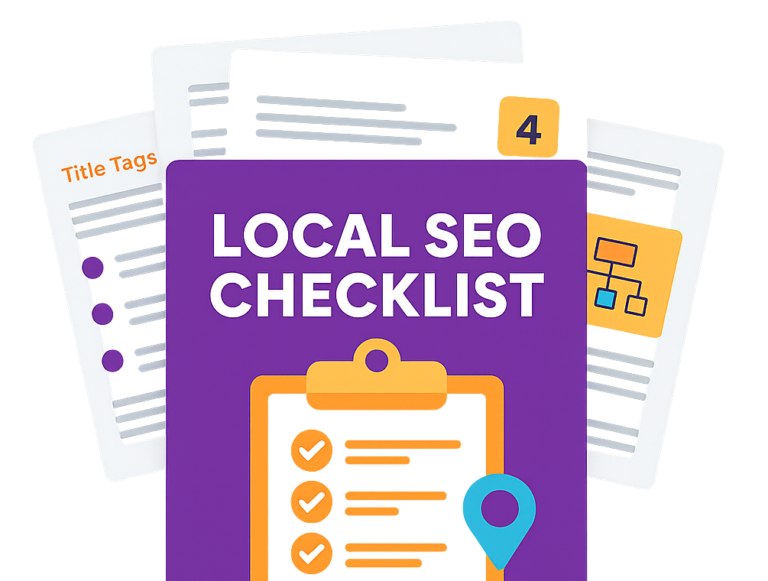For any UK small business, getting found by local customers online isn't just a bonus—it's absolutely vital for staying afloat and growing. At its heart, small business local seo is all about making your business pop up in local search results on Google, putting you directly in front of customers who are actively looking for what you offer, right in their neighbourhood.
Why Local SEO Is A Game-Changer For UK Businesses
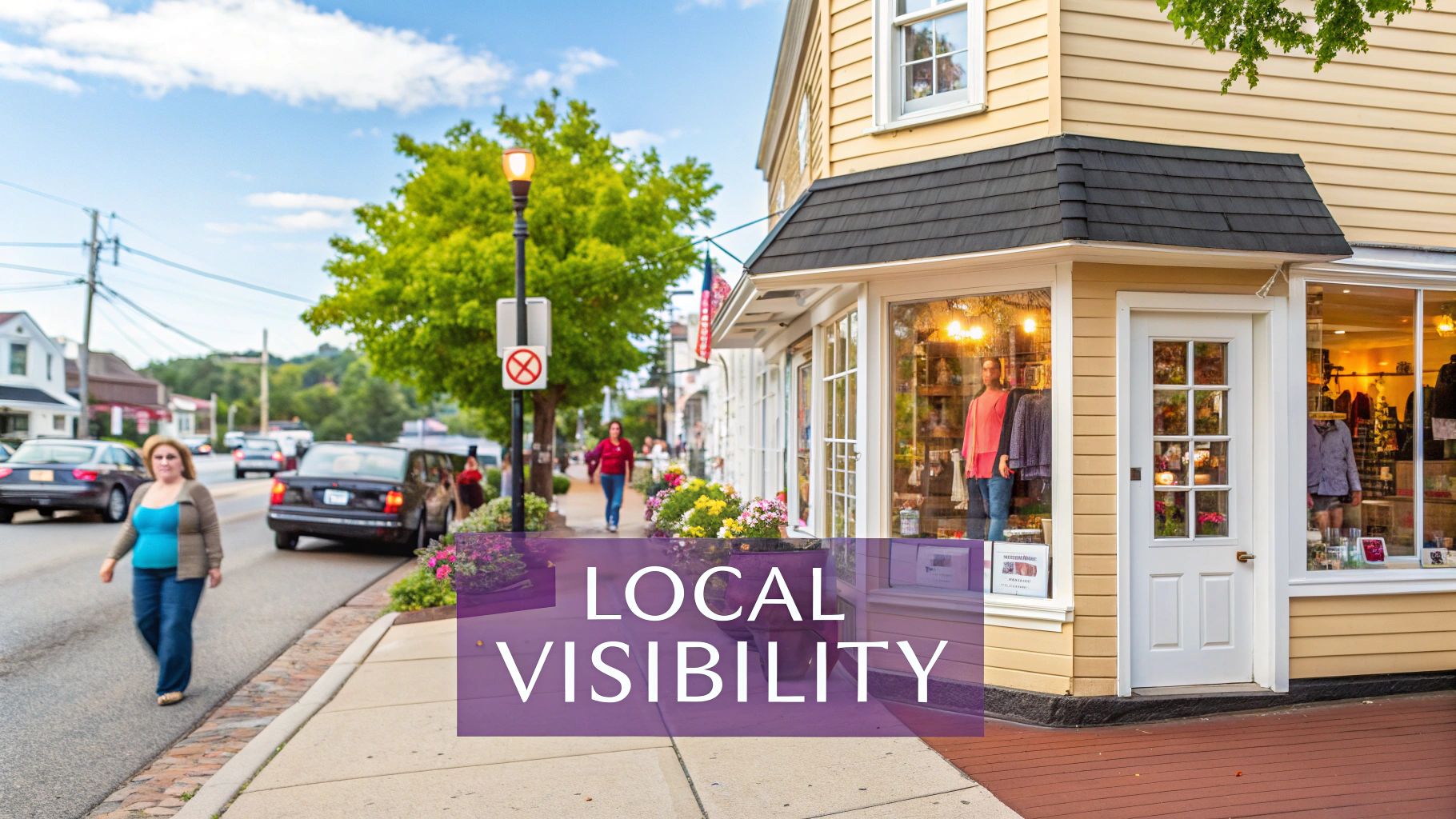
Let's cut through the jargon for a moment. When someone needs something, what's the first thing they do? They grab their phone. They don’t just search for "plumber"; they search for "plumber in Cambridge" or "emergency plumber near CB4". That’s just how we find things now.
A smart local SEO strategy makes sure your business is the one they see in those crucial moments. It’s the fine line between a potential customer finding you or your competitor just down the road.
Understanding Local Search Behaviour
Here in the UK, people search with real local intent. They use postcodes, boroughs, and nearby landmarks to find exactly what they need, where they need it. A recent report showed that UK consumers often use phrases like “best café in Bristol,” which makes getting into Google's map-based local pack a huge priority. Nailing this doesn't just drive website clicks; it brings people through your door and gets your phone ringing.
This hyperlocal behaviour means a generic, one-size-fits-all approach just won't cut it. You have to tailor your online presence to the specific areas you serve.
For a small business, local SEO is one of the most powerful and cost-effective marketing investments you can make. It directly targets customers who are already looking for your exact services, leading to a higher conversion rate than most other forms of advertising.
To give you a clearer picture, let's break down the core components you'll need to focus on.
Key Pillars Of A Successful Local SEO Strategy
This table offers a quick overview of the essential parts of a local SEO strategy. We'll dive into each of these in more detail, but this gives you a great starting point for understanding what's involved.
| Pillar | What It Is | Why It Matters For Your Business |
|---|---|---|
| Google Business Profile (GBP) | Your free business listing on Google that appears in Maps and local search. | This is your digital shopfront. It's often the first interaction a customer has with your business online. |
| Local Citations & Listings | Mentions of your business Name, Address, and Phone number (NAP) across the web. | Consistent information across directories builds trust with Google and customers, proving you're a legitimate local business. |
| Customer Reviews | Feedback and ratings left by customers on platforms like Google, Yelp, and Facebook. | Reviews are a huge ranking factor and provide social proof that encourages new customers to choose you. |
| On-Page SEO | Optimising your website's content and structure for local keywords. | This tells Google exactly what you do and where you do it, helping you rank for relevant local searches. |
| Technical SEO | Ensuring your website is fast, secure, and mobile-friendly. | A technically sound website provides a good user experience, which Google rewards with better rankings. |
| Local Link Building | Getting other local websites to link back to your site. | Links from reputable local sources act as a vote of confidence, boosting your authority and search visibility. |
Think of these pillars as the foundation. Get them right, and you're well on your way to building a strong, visible local presence.
The Tangible Results Of Local SEO
The payoff from a focused local SEO plan isn't just theoretical; it's concrete and measurable. For a service-based business, like a local cleaning company, the goal is straightforward: get more clients and grow. A solid local strategy that includes knowing how to get cleaning clients can become the main engine driving new business enquiries.
Here’s what a successful strategy actually looks like in the real world:
- Increased Footfall: For a brick-and-mortar shop, like a bakery in Manchester, it means more people walking through the door after finding you on Google Maps.
- More Phone Enquiries: For a service provider, like an electrician in Edinburgh, it translates to more calls from homeowners in their patch who need help right away.
- Building a Trusted Brand: When your business consistently shows up with positive reviews and accurate info, you build credibility and become the go-to choice in your community.
Ultimately, local SEO bridges the gap between someone searching online and a real-world transaction. It puts your business on the map—literally—and makes sure you're seen when and where it matters most.
Mastering Your Google Business Profile
Think of your Google Business Profile (GBP) as your digital shopfront. For many potential customers, it's the very first interaction they'll have with your brand. I'd argue that a well-managed GBP is the single most important factor in a successful small business local seo strategy. It’s your number one tool for engaging with customers right in your area.
It’s so much more than just a listing. It’s a dynamic profile where you can showcase your business’s personality, share updates, and directly answer customer questions. Getting this right is fundamental to appearing prominently in both Google Search and Google Maps.
Beyond The Basics: Getting Your Profile Right
Setting up your profile is the first step, but real mastery lies in the details. Just filling in your name and address isn't enough to stand out from the crowd. The goal is to give Google and your customers rich, accurate, and compelling information that makes them choose you over the competition.
Start with your business categories. You get one primary category, but you can—and absolutely should—add several secondary ones. For instance, a pub in Liverpool that serves food should have "Pub" as its primary category, but also add "Restaurant," "Gastropub," and "Sunday Carvery" if they apply. This simple tweak helps you appear in a much wider range of local searches.
Your business description is another golden opportunity. You have 750 characters to tell your story. Don't just list your services; write a compelling narrative. Weave in local keywords naturally. For example, a Bristol-based bakery could mention serving "freshly baked sourdough to the Bedminster community" or being a "favourite coffee spot near Southville." This adds local flavour and gives your ranking a nudge in the right direction.
Leveraging Every Feature for Maximum Impact
An optimised GBP is an active one. Google gives you a ton of features designed for engagement, and using them signals that your business is active and cares about its customers. Neglecting them is like leaving your shopfront windows completely empty.
Here’s what you should be actively managing:
- Google Posts: Use these to announce daily specials, promote events, share blog updates, or offer limited-time discounts. A Manchester plumber could create a post about "Winter Boiler Checks for homes in the M20 area," directly targeting a local need. These posts do expire, so consistent updates are key.
- Q&A Section: Don't wait for customers to ask. Proactively populate this section yourself by thinking of the most common questions you get asked and answering them. "Do you offer free quotes?" or "What are your weekend opening hours?" Answering these upfront saves customers time and shows you're on the ball.
- Products & Services: This is your chance to create a detailed catalogue. Don't just list "Plumbing." Break it down: "Emergency Leak Repair," "Boiler Installation," "Bathroom Fitting," each with its own description and maybe even a price (£). This level of detail helps you rank for those highly specific, high-intent searches.
- Photos and Videos: A picture really is worth a thousand words, especially for a local business. Regularly upload high-quality photos of your premises, your team at work, and your finished products or services. A local café should be full of pictures of its coffee art, its cosy seating area, and happy customers.
This is what the Google Business Profile dashboard looks like, where you can manage all these features from one place.
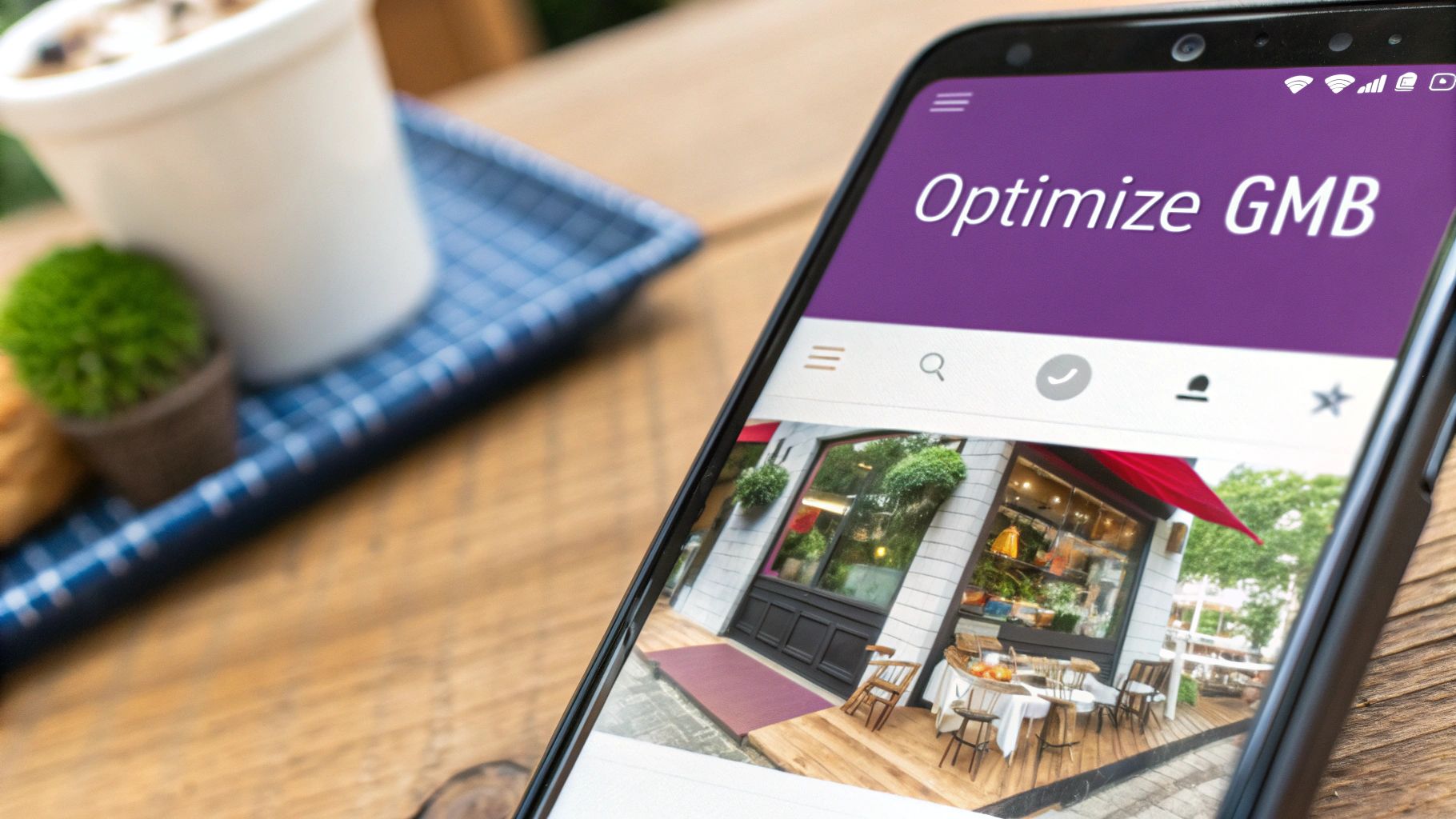
Think of this interface as the control centre for your entire local online presence. It makes it simple to update your information and engage directly with your audience.
The Importance of Accuracy and Consistency
All your hard work will be for nothing if your core information is wrong. Your Name, Address, and Phone number (NAP) must be perfectly consistent across your GBP, your website, and anywhere else you're listed online. An old address or a wrong phone number can kill your rankings and destroy customer trust in an instant.
Pro Tip: Set a recurring calendar reminder to check your GBP information every single month. Double-check your opening hours, especially around public holidays, and make sure every last detail is 100% accurate. Google values accuracy, and so do your customers.
This consistent management is a core part of the optimisation process. For those looking to dive even deeper into refining their profile, our complete guide to Google Business Profile optimisation offers more advanced techniques.
Don't think of your GBP as a static listing. See it as a living, breathing part of your business. It’s your most powerful platform for local engagement. By actively managing it and using all the features at your disposal, you give Google every reason to show your business to local customers who are ready to connect.
Building Trust Through Reviews and Citations
In the world of local business, trust is everything. Online, that trust is built on two things potential customers and Google both care about: reviews and citations. Think of them as the digital equivalent of word-of-mouth. Good reviews build confidence, while consistent business listings across the web prove you’re a legitimate, stable part of the local community.
If you're serious about your small business local seo, you can't afford to ignore either. This is how you convince a searcher to become a customer before they’ve even clicked through to your website.
Encouraging and Managing Customer Reviews
Asking happy customers to leave a review can feel a bit awkward, but it doesn't have to be. The trick is to weave it naturally into your customer service. No one likes being pushed. Just make it simple and ask at the right time—usually right after a successful sale or when you’ve just finished a job well.
The numbers for UK businesses really drive this home. Recent research shows that 42% of UK consumers check online reviews before picking a local business, and a massive 81% of them turn to Google for that feedback. What's even more telling is that 37% won't even consider a business unless it has at least a four-star rating. This isn’t just a marketing task anymore; managing your online reputation is a core part of running a business.
A simple, personalised email can make all the difference. Here’s a quick template you can tweak:
Subject: A quick question about your experience with [Your Business Name]
Hi [Customer Name],
Thanks so much for choosing us for [service/product] recently. We hope you're happy with the result!
We're always looking to improve, and feedback from customers like you is incredibly valuable. If you have a moment, would you be willing to share your experience by leaving us a review on Google?
[Insert your direct Google Review link here]
It only takes a minute and helps other people in [Your Town/City] find us.
Thanks again,
[Your Name]
Responding to every single review—good or bad—is just as crucial. Thank people for the positive comments. For the negative ones, tackle them head-on with professionalism. Acknowledge their point, apologise if you need to, and offer to take the conversation offline to sort it out. It shows everyone watching that you stand by your service. Getting reviews is one thing, but there are proven strategies for asking for testimonials effectively that can really build a powerful online presence.
The Critical Role of NAP and Citations
Now, let's talk about citations. A citation is simply any online mention of your business's Name, Address, and Phone number—your NAP. These listings pop up in online directories, on social media, and on various websites, and they are foundational to good local SEO.
The golden rule here is consistency. Your NAP has to be absolutely identical wherever it appears. A tiny difference, like using "Ltd" in one place and "Limited" in another, or "St." versus "Street," can confuse search engines and weaken your online authority. Google uses these citations to confirm you are who you say you are and that your business is located where you claim. Any inconsistencies plant a seed of doubt and can drag your rankings down.
This infographic breaks down a straightforward process for building accurate local citations.
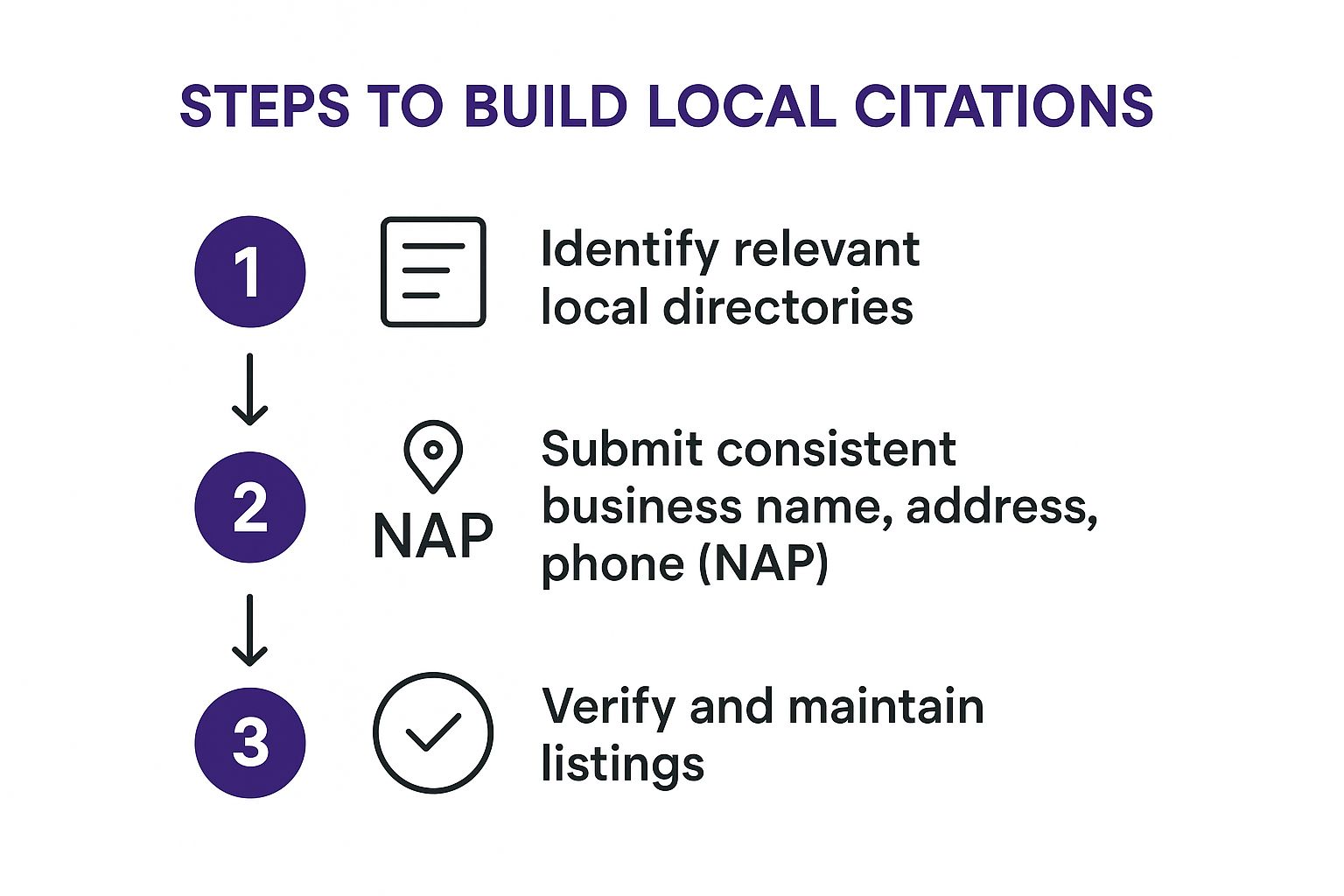
The main takeaway? Consistency and ongoing maintenance are non-negotiable for building a solid local SEO foundation.
Your UK Citation Checklist
Getting your business listed in the right places is key. There are hundreds of directories out there, but you should focus your energy on the ones that actually matter to UK customers and search engines.
Here’s a starter list of the big players you should prioritise:
-
Core UK Directories:
- Yell: A household name in UK business directories.
- Thomson Local: A long-standing, trusted source for finding local businesses.
- The Independent: A reputable newspaper with its own business directory.
- The Sun Directory: Another major paper with a service for local business listings.
-
Essential Global Directories:
- Apple Maps: Absolutely critical for all the iPhone users searching for you.
- Facebook: Your business page is a powerful citation and review hub in its own right.
- Bing Places: Don't forget Microsoft's version of Google Business Profile.
- Yelp: Still a major player in the reviews and directory game.
-
Industry-Specific Sites:
- This is where you get specific. A restaurant absolutely must be on TripAdvisor. A plumber or electrician? You need to be on sites like Checkatrade.
Start by methodically working through these platforms, ensuring your business is listed correctly and consistently. A strong, trustworthy presence across the web sends all the right signals to Google, helping to secure your spot in local search results.
On-Page Optimisation For Local Audiences
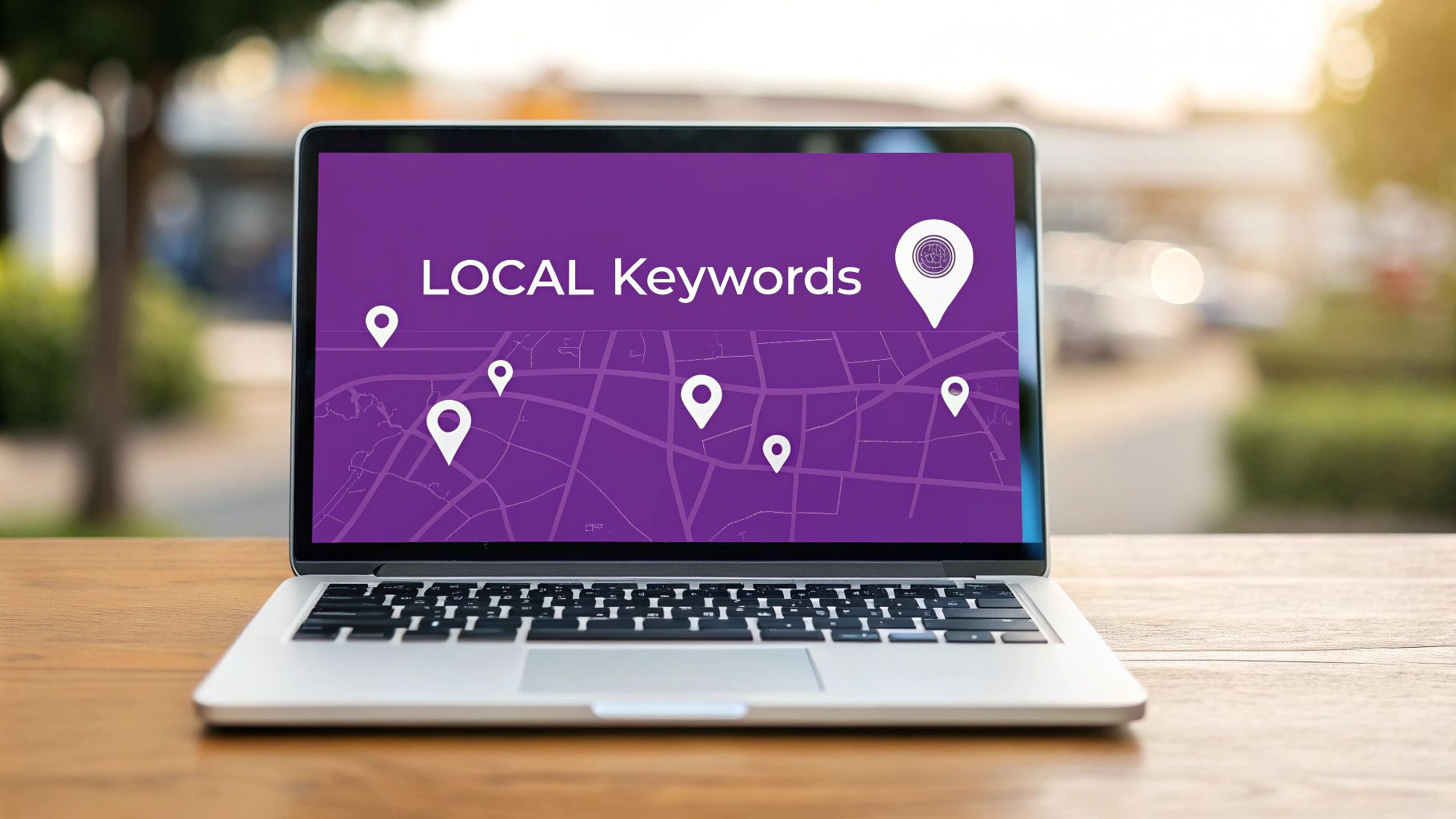
While your Google Business Profile acts as your digital shopfront, your website is your home turf. Getting your on-page optimisation right is how you signal to Google exactly where you are and who you serve, transforming a generic site into a local powerhouse. This is absolutely critical if you want to capture valuable local search traffic.
And the impact is huge. In the UK, a staggering 69% of all digital traffic comes from a combination of local and organic searches. Digging a little deeper, local searches alone are responsible for 22.6% of website traffic for businesses with a physical location. These aren't just numbers on a screen; they represent real people actively searching for local solutions. A few simple on-page tweaks can deliver a massive return. You can check out more stats on UK consumer search habits over on OnTheMap.com.
Infusing Your Content With Local Signals
The easiest win? Optimising your page titles and meta descriptions. These are the first things a potential customer sees in the search results, so they need to instantly shout about your location and what you do. Instead of a vague title like ‘Artisan Coffee Shop’, get specific with ‘Artisan Coffee Shop in Shoreditch’.
This tiny change achieves two things at once: it tells Google about your geographic focus, and it reassures a local searcher that you’re the right choice for them. You have to think like your customers do—they search using town names, postcodes, and even specific neighbourhoods. Your website needs to speak their language.
Your on-page content has to answer two fundamental questions for both users and search engines, and it needs to do it fast: "What do you do?" and "Where do you do it?". In local SEO, clarity and specificity are your best friends.
Creating Locally Relevant Content
Proper on-page SEO goes way beyond just slotting in keywords. It’s about creating genuinely useful content that speaks directly to your local community and positions your business as a neighbourhood authority. This is where you can really pull ahead of competitors who just aren't willing to put in the effort.
Think about creating content like this:
- A pet groomer in Birmingham could write a blog post on "Our Top 5 Dog-Friendly Parks in Birmingham," complete with a handy map.
- An estate agent in Leeds could create a "Neighbourhood Guide to Chapel Allerton," detailing local schools, pubs, and transport links.
- A bike shop in Cambridge could publish a guide to "The Best Family Cycle Routes Around Cambridgeshire."
This kind of content is a magnet for a highly relevant local audience. It builds trust and gives you natural opportunities to link back to your main service pages. Even better, it’s the kind of resource other local websites are happy to link to, which is a big win for your site's authority. To keep all this organised, you might want to look into some of the best local SEO tools for 2024 to help manage your workflow.
Structuring Your Site For Multiple Locations
If your business has more than one physical branch, creating dedicated pages for each one is non-negotiable. A classic mistake is just chucking all your addresses onto a single contact page. All this does is dilute your local signals and leave search engines confused.
Instead, every single branch needs its own unique landing page. For example:
yourwebsite.co.uk/locations/manchesteryourwebsite.co.uk/locations/liverpool
It's vital that each page has unique content—don't just copy and paste the text. You must include the specific Name, Address, and Phone number (NAP) for that branch, along with its opening hours and photos of the local team and premises. And here’s the crucial bit: embed a Google Map pointing to that specific address on the page. This is an incredibly powerful signal that confirms the location for Google. This clear, structured approach gives each branch the best possible chance to rank in its own local search results.
Local Link Building And Community Engagement
Forget what you might think about complex, big-brand link building. When you're a local business, your most powerful links often come from right in your own neighbourhood. Getting genuinely involved in your community doesn't just build your local reputation—it naturally creates the kind of high-quality, local links that Google loves to see. It’s a core part of any smart small business local seo plan.
Think of these links as digital endorsements from other local organisations. They send a strong signal to search engines that you’re a trusted and important part of the community fabric. The best part? You don't need to be an SEO whiz to do this. These strategies are all about building real-world relationships that translate into powerful online authority.
Sponsoring Local Teams and Events
One of the most straightforward ways to get your name out there is through local sponsorship. Is there a youth football team in town? An annual village fete? A charity fun run? These groups almost always have a website where they proudly thank their sponsors, usually with a link back to the sponsor's website.
For a relatively small investment, you can score a high-authority local backlink. For instance, sponsoring a local team for £100-£200 might get your business name on their shirts and, more importantly for SEO, a valuable link from their "Our Sponsors" page. This is more than just a link; it's a public nod to your community spirit, something local customers really notice.
Hosting Workshops or Community Events
Why not share what you know and position yourself as the local go-to expert? A local bookshop could host a free children's story time. A financial adviser could run a workshop on "First-Time Home Buyer Tips." A garden centre could offer a free class on "Container Gardening for Small Patios."
When you promote these events through local online calendars, community Facebook groups, and local news sites, you often pick up valuable backlinks. If a local news outlet writes a short piece about your upcoming workshop, the link they include is a powerful signal to Google about your local relevance and expertise.
The most powerful local links are a by-product of genuine community involvement. Focus on adding real value to your local area, and the SEO benefits will naturally follow.
Partnering With Neighbouring Businesses
Look around your high street or business park. Teaming up with non-competing businesses for a joint promotion can be a fantastic move. A local boutique could partner with a nearby café to offer a "10% off coffee with any purchase" voucher, with the café doing the same in return.
This kind of collaboration gives you a perfect reason to link to each other's websites. You could write a blog post about the partnership, feature them on a "Local Favourites" page, or share the news on social media. It's a true win-win that builds relationships, drives referrals, and earns you relevant local links. To get the most out of these efforts, it helps to understand the bigger picture of how to build backlinks effectively.
Getting Featured by Local Bloggers and Media
Every town and city has its share of local bloggers, influencers, and news reporters who are always on the hunt for a good story. Reach out to them with a compelling angle. Do you have a unique story about how you started? Are you launching an interesting new product? Are you supporting a local charity project?
Getting featured in a local "Best Of" guide or a news story can give your visibility a massive boost. These sites often carry strong local authority, making a link from them pure SEO gold. Building these relationships takes a bit of time and effort, but the payoff can be a real game-changer.
Common Questions About Local SEO For Small Businesses
Getting started with local SEO always brings up a few questions. I get it. It can feel like a lot to take on. So, I’ve put together some straightforward answers to the most common concerns I hear from small business owners.
Let’s clear up a few things so you can move forward with confidence.
How Long Does It Take To See Local SEO Results?
I know you want to see results yesterday, but patience is key with local SEO. While some tweaks, like a fully optimised Google Business Profile, can give you a quick visibility bump in a few weeks, building real, lasting authority takes a bit longer.
Realistically, you should expect to see noticeable movement in your local rankings and a lift in enquiries within three to six months. This isn't a hard-and-fast rule, though. The timeline really depends on things like how competitive your industry is in your area and how consistently you’re putting in the work. Think of it like this: building quality citations and earning local links is a gradual process that delivers sustainable growth, not overnight fame.
Do I Need A Physical Shopfront For Local SEO?
Absolutely not. This is a common misconception. Local SEO is just as critical—if not more so—for service-area businesses. Think of plumbers, electricians, consultants, or even mobile dog groomers. You don’t need a public-facing shop for customers to walk into to benefit massively from a local strategy.
It's simple to set up. In your Google Business Profile, you can hide your physical address and instead define the exact postcodes or towns you cover. This ensures you pop up in those all-important "near me" searches for customers right in your patch. Every single strategy in this guide, from on-page optimisation to getting great reviews, is just as powerful for winning business in your region without a physical shop.
The whole point of local SEO is to connect you with customers in your service area, regardless of whether they visit you or you visit them. It’s about being visible where your customers are actually searching.
Can I Do Local SEO Myself Or Should I Hire An Agency?
For many business owners, especially those on a tight budget, a DIY approach to local SEO is completely doable. Taking control of your Google Business Profile, encouraging reviews, and writing some locally focused content are fantastic first steps. You can make a real impact on your own.
However, if you're in a highly competitive market, bringing in a specialist agency can be a game-changer. They have the expertise, professional tools, and dedicated time for the more advanced stuff like deep competitor analysis, technical SEO, and proactive link building. A great way to go is to build a solid DIY foundation first, and then look to hire an expert as your business grows and your goals get bigger. Plus, getting an expert eye can help you avoid the most common SEO mistakes small businesses make and get a much better return on your time.
How Much Should I Budget For Local SEO?
The cost of local SEO services here in the UK can vary quite a bit. A monthly retainer with a good agency or freelancer might be anywhere from £300 to over £1,500. Where you fall in that range depends heavily on the scope of work and just how fierce the competition is in your local area.
A smaller budget will typically cover the foundational work, like managing your Google Business Profile and building citations. A higher-tier budget, on the other hand, would fund a more comprehensive strategy that includes content creation, technical optimisation, and consistent local link building. The most important thing is to see this as an investment in generating leads and growing your business, not just another monthly cost. Always make sure you get a clear breakdown of what you're paying for before signing anything.
At Bare Digital, we provide a free SEO Health Check and a transparent, tailored Activity Plan so you know exactly where your investment is going. Our bespoke SEO services are designed to deliver market-leading results for Cambridgeshire businesses and beyond. Get your free, no-obligation SEO proposal today!


